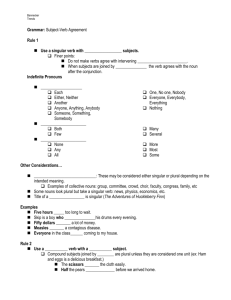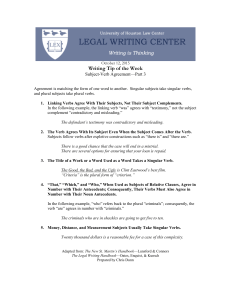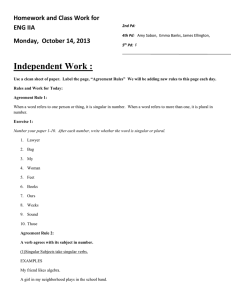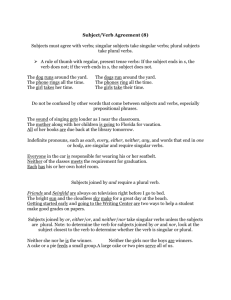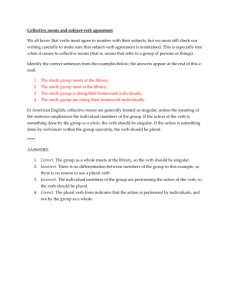Revising: Eleven Trouble Spots in Subject-Verb Agreement
advertisement
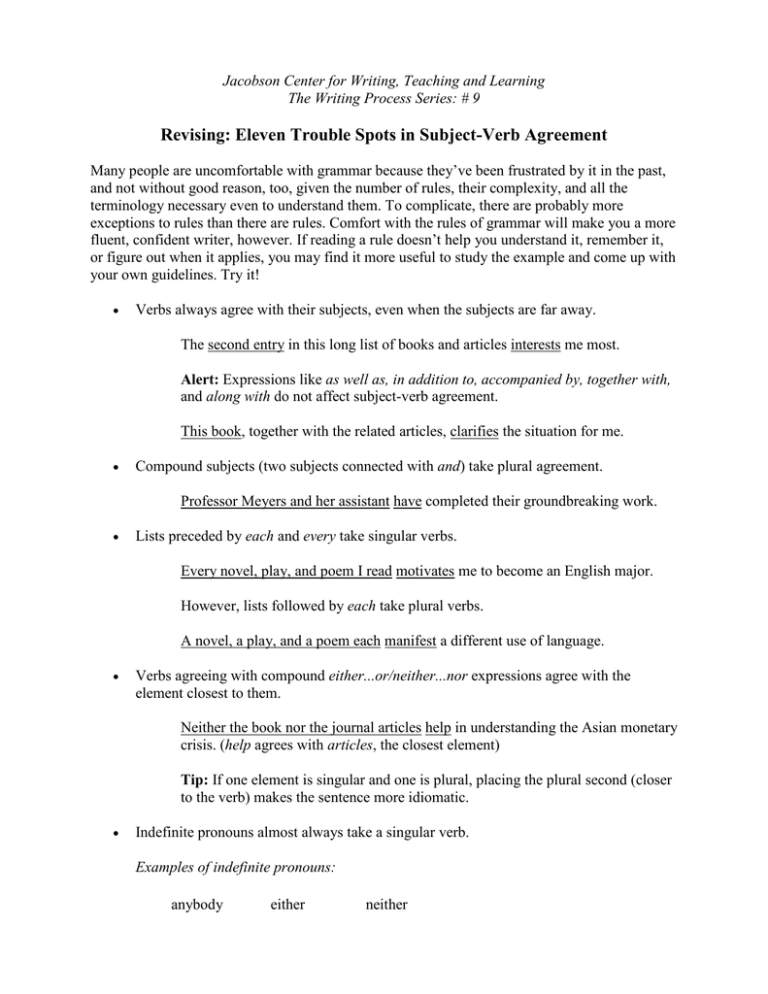
Jacobson Center for Writing, Teaching and Learning The Writing Process Series: # 9 Revising: Eleven Trouble Spots in Subject-Verb Agreement Many people are uncomfortable with grammar because they’ve been frustrated by it in the past, and not without good reason, too, given the number of rules, their complexity, and all the terminology necessary even to understand them. To complicate, there are probably more exceptions to rules than there are rules. Comfort with the rules of grammar will make you a more fluent, confident writer, however. If reading a rule doesn’t help you understand it, remember it, or figure out when it applies, you may find it more useful to study the example and come up with your own guidelines. Try it! • Verbs always agree with their subjects, even when the subjects are far away. The second entry in this long list of books and articles interests me most. Alert: Expressions like as well as, in addition to, accompanied by, together with, and along with do not affect subject-verb agreement. This book, together with the related articles, clarifies the situation for me. • Compound subjects (two subjects connected with and) take plural agreement. Professor Meyers and her assistant have completed their groundbreaking work. • Lists preceded by each and every take singular verbs. Every novel, play, and poem I read motivates me to become an English major. However, lists followed by each take plural verbs. A novel, a play, and a poem each manifest a different use of language. • Verbs agreeing with compound either...or/neither...nor expressions agree with the element closest to them. Neither the book nor the journal articles help in understanding the Asian monetary crisis. (help agrees with articles, the closest element) Tip: If one element is singular and one is plural, placing the plural second (closer to the verb) makes the sentence more idiomatic. • Indefinite pronouns almost always take a singular verb. Examples of indefinite pronouns: anybody either neither somebody nobody everyone each anyone someone none everything everybody anything something no one Everybody agrees that Tibet has undergone profound changes in recent history. • Collective nouns (nouns with a singular form referring to a group) take a singular verb. The audience applauds on cue To emphasize each individual in the collective, the collective nouns can take a plural verb. The audience were already pushing and shoving past each other when the curtain dropped. Alert: The expression the number takes a singular verb, while a number takes a plural one. The number of women with PhDs in computer science is small. Consequently, a number of scholars are advocating for educational reform. Units of measurement take a singular verb when they refer to a collective entity and a plural one when they refer to individuals. A quarter of the gas condenses within 15 seconds. A quarter of the tests reveal nothing that we don’t already know.. • Verbs agree with their subjects even when the subjects are placed out of order for stylistic effects. There are seven tests in the procedure. (seven tests is the real subject) • Verbs never agree with their subject complements (the object-like expressions following the verb to be), even though you may feel a tendency to make them do so. Drafting and revising are the best way to improve one’s writing.> • Who, which, and that agree with the nouns to which they refer. Support your local food co-op, which is worker-owned. (which refers to co-op, which is singular, so the verb is singular) • Some words have plural forms (e.g. the disciplines as bodies of knowledge: economics, physics; or diseases: mumps, measles), but take singular agreement. Statistics belongs in a college’s basic curriculum. However, when these words refer to single items, they take plural agreement. Regarding teenage pregnancy, the statistics astound me. • The titles of works and words written as words take a singular verb. In conclusion, Sons and Lovers deserves a very high place in the literary canon. Bats is the plural of bat. Copyright 2000, the Jacobson Center for Writing, Teaching and Learning at Smith College.



